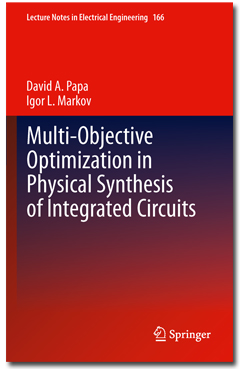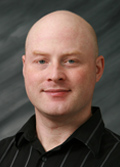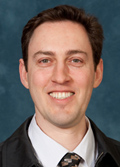Computer scientists author book on physical synthesis optimization

 Enlarge
Enlarge

 Enlarge
Enlarge

 Enlarge
Enlarge
CSE alumnus Dr. David Papa and Professor Igor Markov have authored a new book entitled “Multi-Objective Optimization in Physical Synthesis of Integrated Circuits,” which has been published by Springer. Dr. Papa worked for a number of years at the IBM Austin Research Laboratory (ARL), and the book draws on both his doctoral research at Michigan and his extensive experience designing the world’s largest integrated circuits at IBM.
Conventional logic synthesis generates compact, fast and energy-efficient logic circuits that perform required functions. However, in the last ten years semiconductor scaling shifted the performance and power bottlenecks from logic gates to interconnect, but interconnect characteristics depend on the physical implementation of the circuit (especially wire lengths) that is not available during logic synthesis. To address this challenge, physical synthesis restructures logic circuits while also optimizing physical characteristics, such as gate locations and sizes. Such optimizations were the focus of David Papa’s doctoral research and his work at IBM Research.
The book introduces techniques that advance the capabilities and strength of modern software tools for physical synthesis, with the ultimate goal to improve the quality of leading-edge semiconductor products. It provides a comprehensive introduction to physical synthesis and takes the reader methodically from first principles through state-of-the-art optimizations used in cutting edge industrial tools. It explains how to integrate chip optimizations in novel ways to create powerful circuit transformations that help satisfy performance requirements.
David Papa received his PhD in Computer Science and Engineering from the University of Michigan in 2010, where his advisor was Prof. Markov. Dr. Papa received the 2010 Outstanding Dissertation Award in the area of “New directions in physical design, design for manufacturing and CAD for analogue circuits and MEMS” from the European Design and Automation Association (EDAA) for his dissertation, “Broadening the Scope of Multi-Objective Optimizations in Physical Synthesis of Integrated Circuits.” He is currently a Senior Developer at Broadway Technology.
Igor Markov received his PhD in Computer Science from UCLA in 2001 and joined the faculty at Michigan in 2000. His research interests include computers that make computers (software and hardware), secure hardware design, combinatorial optimization with applications to the design, verification and debugging of integrated circuits, as well as in quantum logic circuits. New algorithmic techniques developed by Prof. Markov have been implemented in open-source projects and industry tools, leading to order-of-magnitude improvements in practice. He is a senior member of IEEE and an ACM Distinguished Scientist.
 MENU
MENU 
